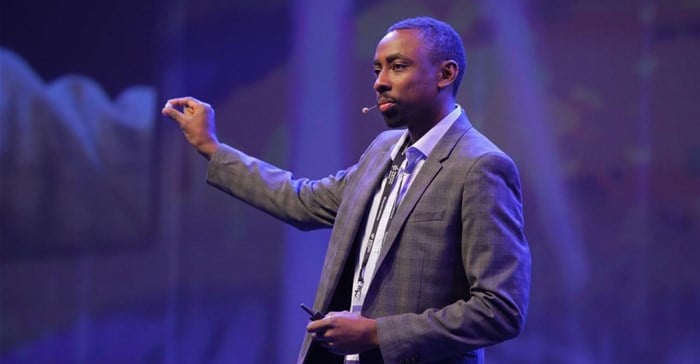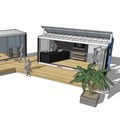
Murendeni Mafumo speaking at the SingularityU South Africa Summit 2019. Image supplied.
Imagine if we could use exponential technology in Africa, a continent that has so many challenges? If we were to collect all of Earth's water, it would fit into just a fraction of the North American continent and only a small part of it would be accessible. Only 2.5% is accessible and drinkable of the 70% of the water which covers the world.
According to the UN, water use has grown at more than twice the rate of the population increase in the last century. By 2025, an estimated 1.8 billion people will live in areas plagued by water scarcity. The challenge we face as we head into the future is how to effectively conserve, manage and distribute the water.
Meet Kusini Water
What is the future of cities? And what is the future of water collection, purification and distribution? How do we share the water needed with agriculture when 50% of all water projects fail within the first two years? Murendeni Mafumo is a social entrepreneur and has created a water purification system to serve needy communities.
Kusini Water is a South African (direct trade) solution: A locally-designed water purification system that uses locally-produced macadamia shells – off-waste material – to make an activated carbon filtering system. It can remove 99.99% of all the chemicals in waters. It helps build communities both up and downstream.
The device purifies at least 1,000 litres of water a day. It uses the nutshells, not so much for their chemical properties but their strength. They also work to harness the use of nanotechnology fibres to separate various bacteria from the water. You do not see the nutshells in the filter – they are incinerated and processed, and are part of the system that cleans water from any source. The nutshells, which would have been discarded, are sourced from small-scale farmers.
Kusini Water currently operates in Hammanskraal, Heidelberg and Joe Slovo.
The future of water
"In Heidelberg, we have tried to make it as automated as possible, and it can be controlled remotely. This ensures that the system knows when it will need maintenance," says Mafumo.
How do we take unmapped communities that are not within the water map and immediately bring a solution? The technology needs to speak to the condition of the area and use locally-sourced material.
The aim of Kusini Water is to bring about a systemic change in communities currently underserved when it comes to water and sanitation. The future of water, for Kusini Water, lies in decentralising how communities and government works around water along with rethinking around the continent consumes water.










































